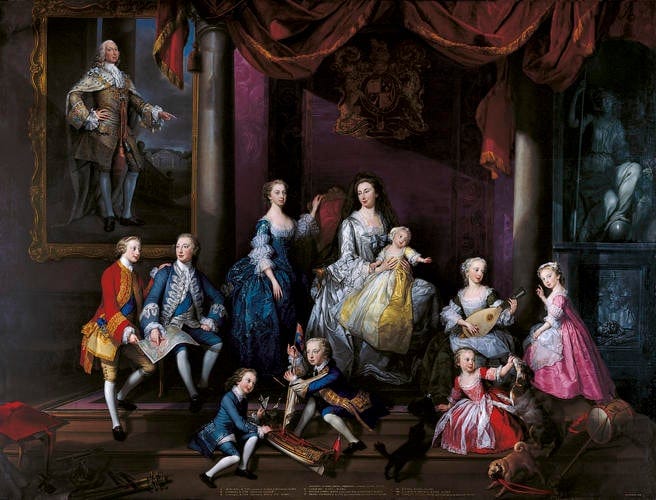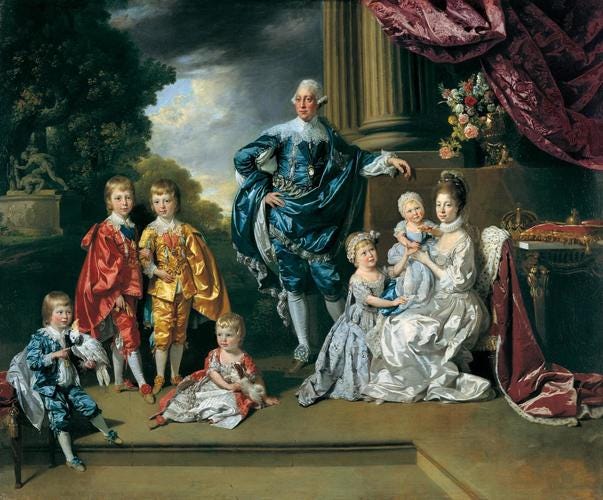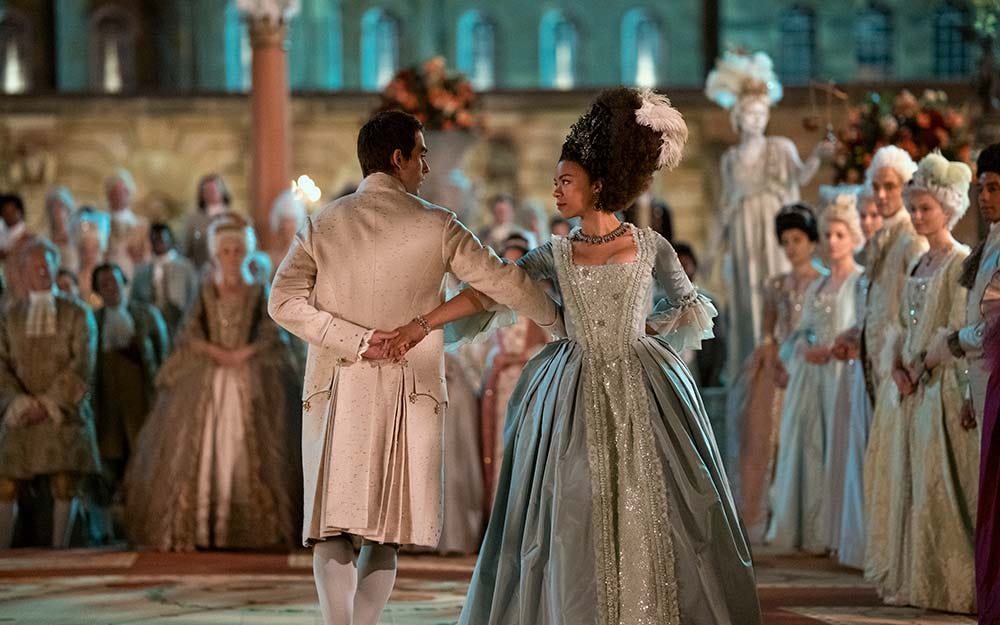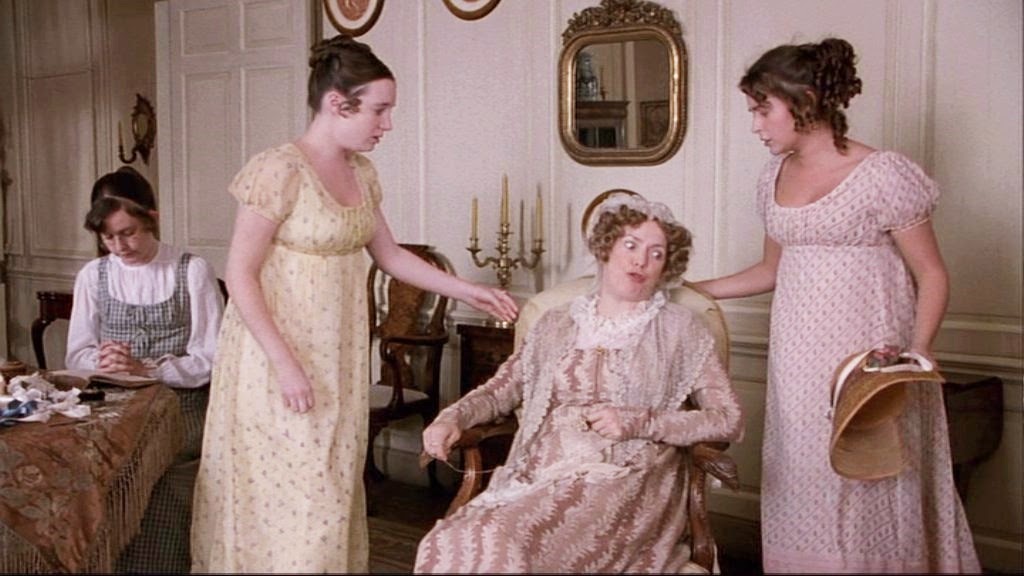Review: Queen Charlotte (2023), Part II - The History
Disclaimer: Lady Whistledown makes it very clear at the opening of the show that this is an alternate universe from reality, so I never expected it to line up with real history and I do not fault it as “wrong” for not doing so! But I will be comparing what happens on the show with reality for discussion purposes.
A lot of this show revolves around dynastic politics, particularly of the House of Hanover. A brief background on the Hanoverians, which the show doesn’t get into:
Queen Anne of Great Britain (that is, Olivia Colman in The Favourite (2018)) had no heirs. Because her nearest relations were Catholic and the British state was officially Protestant, the succession stepped around them and went to her nearest Protestant cousin, Sophia - Sophia was a granddaughter of King James I/VI of England and Scotland, and was married to the Elector of Hanover. By the time Anne died, Sophia had also died, and so the throne went to her eldest son, George I in 1714.
George I was 54 at the time, his son (the future George II) was 31, and his grandson (Frederick) was 7. All three of them, and the rest of their family, were very much German, as much as the German identity existed in the Holy Roman Empire without an actual “Germany”; they continued to retain the title of Elector of Hanover, and sometimes travel to it. Frederick was in fact left to grow up there until he was 20, when George II succeeded to the throne and he became Prince of Wales. He married Princess Augusta of Saxe-Gotha about ten years later, and the two had a sizeable family.
Frederick died in 1751, and George II outlived him by nine years. Frederick’s eldest son, George III, succeeded his grandfather at the age of 22, which was young for a coronation in the eighteenth century. And that’s where Queen Charlotte picks up, basically.
In the show, the fate of the British monarchy, or at least the House of Hanover, is resting on George’s ability to get married and produce an heir as soon as possible. On the one hand, this may be part of the divergence from real history, done intentionally by Shonda Rhimes: George has no apparent siblings, no aunts and uncles and cousins, and Augusta frames the family’s position as in dire jeopardy if something should happen to George before he can marry and reproduce. But this type of thing has become very common in fiction about premodern royalty, and I think it owes a lot to the ever-popular Tudors - the Tudors were a genuinely precarious dynasty, very new and facing claimants from the previous royal family while also dealing with problems in the succession. I’d also point to the popularity of Marie Antoinette, who was known to have been badgered by her mother over the importance of her having children and securing her position as queen, which was highlighted in Marie Antoinette (2006) - again, a different situation than this. It’s become such a cliché in royal fiction, used to impart a sense of urgency when there is no actual danger (like a war, a usurper, a rebellion, &c.), that it falls flat for me as character motivation at this point. The Tudors didn’t have many good options and Marie Antoinette was trying to cement a diplomatic alliance, but in any other situation I tend to get impatient with it as a cause for drama. (Maybe I just Know Too Much.)
Marie Antoinette has an interesting resonance with Queen Charlotte: both begin with the heroine taking off for an arranged marriage in a foreign country. But these heroines are very different - the former is naive and thrust, unprepared, into the rigid etiquette of Versailles; the latter is confident and prepared to take her place as queen in the English court. But as soon as she arrives, panic ensues: nobody realized that she would be Black. (One of Augusta’s advisors mentions that she has “Moor blood” - a reference to the fact that the real Charlotte had an ancestor fifteen generations back who might have been Moorish.) In response, Augusta invites a number of Black members of the gentry to the wedding and ennobles them. George makes a good impression on Charlotte, talking her back into the ceremony, but afterward he leaves her at Buckingham House and heads off to Kew Palace with no explanation. Their relationship builds in fits and starts - she builds a certain intimacy with him and gets him to consummate the marriage, then overhears him apparently complaining about it and they’re back to step one (except that now they’re having passionate sex all the time, because this is the Bridgerton universe). Eventually, she discovers his passion for agriculture, and shortly afterward, his mental illness.
Once that bit of knowledge is unlocked for Charlotte, the beginning of the series is reframed through his eyes. While Charlotte was frustrated and alone, George was suffering the ministrations of a very unethical doctor. (At first, his understanding that this illness was mental rather than physical seemed like a green flag, but almost immediately the torture started.) Charlotte was chosen as his wife because she was so obscure that Augusta assumed she’d never dare address the fact that her husband responds very badly to stress, goes non-verbal, &c. I go back and forth on the show’s treatment of George’s condition. On the one hand, they give him a grab-bag of symptoms that are selected to make him sympathetic. On the other, that’s perhaps better than trying to diagnose the real historical figure (you may think you know he had porphyria - that was from a paper in the 1970s and was subsequently “canonized” in The Madness of King George (1994), but more recent research has debunked the theory) or to badly represent a real condition.
(This was an interesting bit for me. As mentioned earlier, the Hanoverians were a very German family - they also near-constantly intermarried with people from the various German principalities and duchies, partly for cultural reasons and partly because they had to marry Protestants. When George and Augusta talk about his upcoming marriage, George makes a remark about looking for a bride among the British aristocracy and then calls a German princess “exotic”. In reality, George III wanted to marry a young subject (post on this to come) but was talked about of it by his mother and Lord Bute, and a German bride was the least exotic possible option. The real Charlotte was chosen by George because she was highly respectable, ready to subsume herself in his will, and not overly interested in academic subjects. Also! Rather than spending lots of time apart, George insisted on having Charlotte by his side from the beginning of their marriage. He was determined to reform the view of the monarchy and set a good example to his subjects, and was focused on creating an unimpeachable domestic image.)
And at the same time, Charlotte is pregnant! This adds a new stressor to both parents as well as the relationship itself, along with George taking up his royal duties by planning to address Parliament. The birth is traumatic - the baby’s breech and the doctor chooses not to interfere, because as is always the case in fiction, Historical Doctors Are Quacks, but George barges into the delivery room to soothe and help his wife. (The real Charlotte made use of a very successful and prosperous midwife, Mrs. Mary Draper, as well as a well-educated and also very successful accoucheur, Dr. William Hunter. Charlotte was only in labor for two hours and there were no problems - Hunter didn’t even get involved.) George follows this success by going to Parliament and collapsing in his carriage; after he comes back home, he and Charlotte discuss his condition and are probably the closest that they’ve ever been. She’s also pregnant again, letting their 1760s storyline end on a hopeful note.
Overall, I find the main storyline/romance in Queen Charlotte to be compelling - it’s a bit stereotypical for my taste, but it has real heart in it and does avoid some of the most annoying clichés. It’s very clearly got romance novel bones, but it’s less of a Romance Novel Show than Bridgerton (if that’s an issue for you).
One thing that does stand out to me is that, as I touched on above, the show represents George as a sweet man who loves having Charlotte be strong for and with him when the actual couple was much more patriarchal. Does this bother me? No, not at all - any work of fiction based on real historical people is going to have to sand off their problematic edges. It’s just that there’s been some real discourse about Our Flag Means Death (2022- ), which centers on a romance between Stede Bonnet and Blackbeard, and the fact that the real historical figures involved were terrible people has led to some condemnation. It seems odd that Queen Charlotte doesn’t provoke the same outrage for portraying George III as a sweetheart and Charlotte as *sigh* a #girlboss, and one has to wonder if its heterosexuality acts as a kind of veil.
In contrast to Charlotte the initially virgin princess, Agatha Danbury is introduced mid-coitus, which is obviously an unpleasant duty for her. This actually makes me fascinated with her as a character, because it’s so common in this genre for the lecherous older man to be a threat that’s never realized: marrying him and bearing his children is the “lose” scenario that would end a female character’s story. In Queen Charlotte, however, there is a life beyond the Bad End. Agatha makes herself indispensable to both Charlotte and Augusta, outlasts her husband, and ensures that their new title is hereditary. (I did feel like Lord Danbury’s father being the king of Sierra Leone was a fantastic way to situate the characters in the wider world outside of Britain, but also a big loose thread - why was Danbury not already considered an aristocrat? Why was he living in England?)
She finally has a chance to explore herself - to find out her own preferences, since she was molded to match her husband’s as a child - and to spend time on her own. And wouldn’t you know it, but she soon ends up in the company of Lord Ledger, the father of the future Violet Bridgerton? They start to kindle a romance, but it’s cut short by Ledger and young Violet. Then she’s courted by Charlotte’s brother, and this time Agatha herself chooses to cut it short for her own independence.
Agatha’s storyline was a delight. It’s … not exactly something you expect, for a romance show that’s part of a romance franchise to have an important character whose storyline isn’t either a) overcoming obstacles to achieve a Happily Ever After or b) losing out on an HEA in order to serve as a cautionary tale about seizing the day. Lord Ledger was never going to be a good partner for her because he’s married (but I have to admit that I was rooting for them to some extent, they were adorable going on their rambles together), and Charlotte’s brother just didn’t seem to strike a real spark with her, as much as she might have liked the position he could offer her. Honestly, she deserves her own series! The benefits of widowhood don’t appear in many historical dramas.
I haven’t mentioned Brimsley because he’s extremely tangential to the action, but he brought me great happiness, so let’s discuss! Brimsley is Charlotte’s right-hand man, and he appears completely loyal to her. His counterpart for the king is Reynolds, equally loyal, and the two of them are lovers - tenderer ones than any others on the show in some ways. I didn’t really expect a Bridgerton production to even acknowledge queerness, let alone handle a gay love story so well! Presumably there’s more Queen Charlotte to come down the pike: Brimsley and Reynolds seem happy in their clandestine romance, but in the Regency storyline Reynolds is mysteriously missing and Brimsley asks Charlotte, “Who would spend a lifetime with me?” and that MUST be explained. If Reynolds left him willingly I will RIOT.
The Regency storyline has much less screen time, so I’ve left it for the end. Basically, Charlotte wants her children married off because her son’s only heir has died, Violet the Dowager Viscountess is suddenly extremely horny, and Agatha is there to advise both of them. Violet also comes to realize that Agatha had some sort of relationship with her father decades prior, but doesn’t press the issue.
Another explanation of the history behind the show: the real George III and Queen Charlotte had many children and kept them in a rather secluded domestic lifestyle, which they enforced with discipline. Perhaps predictably, their children rebelled. Their sons had unhappy marriages and debts; most of their daughters were not allowed to marry and some of them seem to have had affairs with equerries at court. Their eldest son, Prince George (I’m sorry, they’re just all named George), was illegally married to a Catholic actress until he was pressured into a proper marriage with a proper German princess, but the two separated as soon as their daughter, Princess Charlotte, was conceived. The young Charlotte was seen as the bright hope of the monarchy, but she died in childbirth along with her son in 1817, which plunged the country into mourning and presented a problem: there was no younger generation in the royal family. This set several marriages in motion and eventually resulted in the birth of Princess Alexandrina, the future Queen Victoria.
In Queen Charlotte, this all seems to be about the same! The major difference is that the princesses’ singlehood is simply a problem of their not having applied themselves to getting married, which traces back to the same issue of British royalty being treated as just a higher level of the aristocracy. However, princesses were supposed to marry princes, and their marriages were supposed to be arranged by their parents - had to be arranged by their parents, because they were diplomatic arrangements that took them into new courts. Marrying any British man would have been a step down and completely useless politically. In this context, it’s extremely unfair for Charlotte to berate them for not trying hard enough to get married. Toward the end of the show, the Prince Regent and one of her daughters confront her about the fact that everyone is trying to give her a grandchild, but that miscarriages abound and she is compounding the hurt with her insults. She gets her forgiveness in the form of Edward telling her that his wife is pregnant - with, if you know your royal history, Victoria. Which definitely leads me to wonder if Shonda Rhimes will eventually turn her eyes to the decades after the Regency …
Charlotte then goes to find George, now completely in the grip of his unspecified condition, to tell him about their family’s dynastic success. She can only connect with him when they both lay under his bed in a callback to a scene from the main storyline, and it’s genuinely moving.
Ultimately, while Queen Charlotte makes numerous large departures from history, it does so in service of a story that does feel worthy of being told. And I kind of hope that we continue to see obscurer figures like Charlotte given the dramatic treatment! (Still holding out for The Hanoverians.)






Comments
Post a Comment